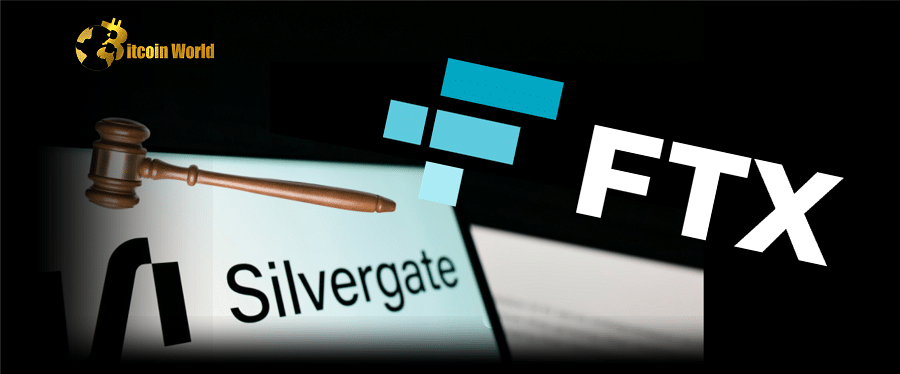The cryptocurrency world is no stranger to volatility, but the dramatic implosion of FTX sent shockwaves far beyond the exchange itself. One of the most significant aftershocks hit Silvergate Bank, a financial institution deeply intertwined with the digital asset industry. What exactly happened, and what does it mean for the future of crypto-friendly banking?
The FTX Effect: A Mass Exodus from Silvergate
Imagine a bank primarily serving the burgeoning cryptocurrency sector. That’s Silvergate. Now, picture the sudden and catastrophic failure of one of its major clients, FTX. According to a recent Wall Street Journal report, this is precisely what triggered a massive withdrawal of funds from Silvergate, totaling over $8 billion. That’s a staggering sum, and it highlights the interconnectedness – and inherent risks – within the crypto ecosystem.
The Domino Effect: How FTX’s Fall Impacted Silvergate
The relationship between Silvergate and FTX was more than just a typical banker-client dynamic. Silvergate had positioned itself as a key player in facilitating transactions for crypto firms. When FTX crumbled, the fallout for Silvergate was swift and severe:
- Massive Withdrawals: As mentioned, over $8 billion in deposits fled the bank as clients scrambled to secure their assets in the wake of the FTX debacle.
- Workforce Reduction: To cope with the financial strain, Silvergate was forced to make the difficult decision to reduce its workforce by a significant 40%.
- Digital Asset Plans Abandoned: The bank had aspirations to launch its own digital asset, but these plans were shelved as the immediate priority became navigating the crisis.
- Debt Liquidation: Silvergate had to liquidate $718 million in balance-sheet debt holdings to bolster its financial position.
- Stock Price Plunge: The market reacted sharply, with Silvergate’s stock price plummeting by more than 70% in just three months.
Silvergate’s Unique Position in the Crypto World
Founded in 1988 and going public in 2019, Silvergate carved a niche for itself by catering specifically to the needs of cryptocurrency companies. Its services included managing virtual assets and operating the Silvergate Exchange Network (SEN), a platform that connected traders with various crypto exchanges. This focus on the crypto industry, while initially advantageous, became a vulnerability when the market experienced significant turmoil.
The Extent of the FTX Connection
At the time of FTX’s collapse, Silvergate held approximately $1 billion in assets belonging to FTX and its affiliated entities. This significant exposure underscores the deep financial ties between the two companies and explains the severity of the impact on Silvergate.
How Did Silvergate Weather the Storm (Relatively Speaking)?
Interestingly, the report highlights that Silvergate had strategically sold off the majority of its traditional banking operations to concentrate on the crypto sector. This unconventional approach, while risky, provided a degree of insulation during the mass withdrawals. Unlike traditional banks with extensive retail and commercial lending, Silvergate’s focus allowed it to withstand the sudden outflow of funds without facing immediate collapse. However, the long-term implications remain to be seen.
Still a Believer? Silvergate’s Optimistic Outlook
Despite the significant challenges and market volatility, Silvergate maintains a positive outlook on the future of cryptocurrencies. As stated to The Wall Street Journal, “Although Silvergate is taking decisive action to navigate the current environment, its mission remains unchanged. Silvergate is optimistic about the digital asset industry.” This unwavering belief is crucial for the company’s survival and its ability to attract future business in the crypto space.
What Can We Learn from Silvergate’s Experience?
The Silvergate situation offers several key takeaways for investors, businesses, and anyone interested in the cryptocurrency market:
- Interconnectedness of the Crypto Ecosystem: The rapid and significant impact of FTX’s failure on Silvergate demonstrates the interconnectedness of the crypto world. The failure of one major player can have cascading effects on others.
- Risk Management is Paramount: For financial institutions dealing with volatile assets like cryptocurrencies, robust risk management strategies are essential. Concentrated exposure to specific clients or sectors can be highly dangerous.
- Diversification Matters: While Silvergate’s specialized focus initially provided an edge, the current situation highlights the importance of diversification, even within the crypto industry.
- Transparency and Due Diligence: The FTX collapse underscored the need for greater transparency and thorough due diligence when dealing with crypto entities.
- The Importance of Regulatory Clarity: The ongoing regulatory landscape surrounding cryptocurrencies plays a significant role in the stability and risk assessment of related businesses.
Looking Ahead: The Future for Silvergate and Crypto Banking
Silvergate’s ability to navigate this crisis will be a significant test of its resilience. While the immediate fallout from the FTX collapse has been substantial, the company’s commitment to the digital asset industry suggests a long-term vision. The future of crypto banking will likely be shaped by the lessons learned from this event, with a greater emphasis on risk management, regulatory compliance, and potentially, a more diversified approach to client relationships.
The story of Silvergate serves as a stark reminder of the inherent volatility and risks associated with the cryptocurrency market. While the potential for innovation and growth remains, the industry is still maturing, and events like the FTX collapse have significant consequences for all involved. Whether Silvergate can successfully weather this storm and continue to be a key player in crypto banking remains to be seen, but its experience offers valuable insights into the evolving landscape of digital finance.
Disclaimer: The information provided is not trading advice, Bitcoinworld.co.in holds no liability for any investments made based on the information provided on this page. We strongly recommend independent research and/or consultation with a qualified professional before making any investment decisions.


